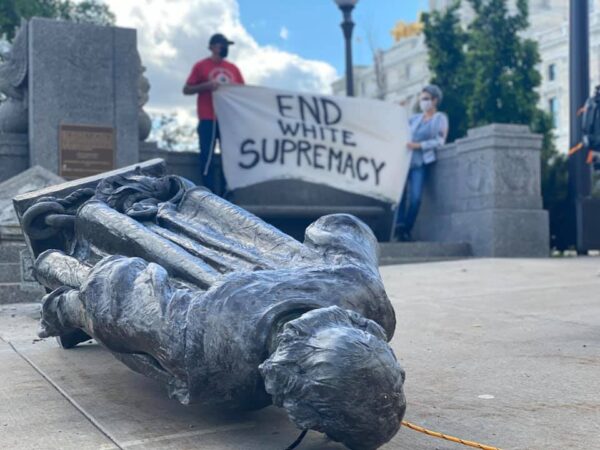
- Details
- By Levi Rickert
Opinion. On Monday we celebrate Indigenous Peoples’ Day in the United States. Well, some of us do.
Across the United States, tribal, federal, states, and local governments will be closed. They are closed because Monday is a federal holiday. Of course, the federal holiday does not celebrate Indigenous Peoples’ Day. Instead, the federal holiday celebrates Christopher Columbus, ignoring the actual history of the man.
[Editor's Note: This opinion was first published on October 9, 2022. It is republished today to commemorate Indigenous Peoples' Day with minor edits.]
Growing up, I was not taught Columbus really was a lost sailor who was heading in a whole different direction than the western hemisphere.
I was also not taught Columbus actually never set foot on the land that is now known as the United States.
Nor was I taught of the atrocities that Columbus and his men perpetrated on the innocent Indigenous peoples in the western hemisphere: the raping of Indigenous women, the thievery of goods, and ultimately of the land.
No, what I was taught was a constructed false narrative that began in elementary school about how “Columbus sailed the ocean blue in 1492” and that he discovered America.
From early childhood as a young Potawatomi boy, I began to view history from a different lens than my non-Native students. Native Americans reject the notion you can discover land where inhabitants already live.
So, Columbus Day was a federal holiday that I felt uneasy about as it approached each October. Even as a child, I felt sick for the portrayal of Columbus as a hero, knowing our country’s constructed history was a hoax.
As an adult, I learned our Indigenous ancestors paid a premium price because of Columbus.
Author Jack D. Forbes writes the following in Columbus and Other Cannibals: “I will argue that we can compare the commemoration of Columbus with the doings of the neo-Nazis organizations in Europe and the Americas, groups which commemorate the great dates of Hitler’s regime.
“The difference is that the neo-Nazis are a minority and their commemorations usually do not receive much attention. The followers of Columbus, on the other hand, occupy seats of power throughout much of the Americas. Their holidays are national ones, often imposed on their respective societies.”
To Native Americans, Columbus is not considered a hero to be placed on a pedestal; rather, he is considered a dishonored villain. Indigenous people believe that a man who set in motion the mass genocide of this land’s first people should not be honored or glorified.
For this reason, Native Americans have worked to change the celebration of Columbus Day to instead be called Indigenous Peoples’ Day. In recent years, in cities and states around the country, Indigenous Peoples’ Day has gained recognition.
Now, it is time for the federal government to say goodbye to Columbus and fully embrace Indigenous Peoples’ Day.
Two years ago, in his first year in office, President Joe Biden issued a proclamation to recognize Indigenous Peoples’ Day. He was the first U.S. president to do so.
Last Friday, Biden declared Monday, October 9, 2023 as Indigenous Peoples’ Day. The proclamation reads in part:
"On Indigenous Peoples' Day, we honor the perseverance and courage of Indigenous peoples, show our gratitude for the myriad contributions they have made to our world, and renew our commitment to respect Tribal sovereignty and self-determination.
The story of America's Indigenous peoples is a story of their resilience and survival; of their persistent commitment to their right to self-governance; and of their determination to preserve cultures, identities, and ways of life. Long before European explorers sailed to this continent, Native American and Alaska Native Nations made this land their home, some for thousands of years before the United States was founded. They built many Nations that created powerful, prosperous, and diverse cultures, and they developed knowledge and practices that still benefit us today.Keeping Columbus Day as a federal holiday allows the constructed hoax of Columbus discovering America to be perpetuated from one generation of Americans to the next. That needs to change."
But today, even as people around this country celebrate the lost sailor, I’m not going to let it ruin my day. Instead, I’m going to celebrate Indigenous Peoples’ Day with a smile because of the survival skills of our ancestors and the fact that we, the Indigenous peoples of this land, still remain.
Thayék gde nwéndëmen - We are all related.
More Stories Like This
The SAVE America Act Threatens Native Voting Rights — We Must Fight BackThe Presidential Election of 1789
Cherokee Nation: Telling the Full Story During Black History Month
Jesse Jackson Changed Politics for the Better
Native News Online at 15: Humble Beginnings, Unwavering Mission
Help us defend tribal sovereignty.
At Native News Online, our mission is rooted in telling the stories that strengthen sovereignty and uplift Indigenous voices — not just at year’s end, but every single day.
Because of your generosity last year, we were able to keep our reporters on the ground in tribal communities, at national gatherings and in the halls of Congress — covering the issues that matter most to Indian Country: sovereignty, culture, education, health and economic opportunity.
That support sustained us through a tough year in 2025. Now, as we look to the year ahead, we need your help right now to ensure warrior journalism remains strong — reporting that defends tribal sovereignty, amplifies Native truth, and holds power accountable.
 The stakes couldn't be higher. Your support keeps Native voices heard, Native stories told and Native sovereignty defended.
The stakes couldn't be higher. Your support keeps Native voices heard, Native stories told and Native sovereignty defended.
Stand with Warrior Journalism today.
Levi Rickert (Potawatomi), Editor & Publisher


